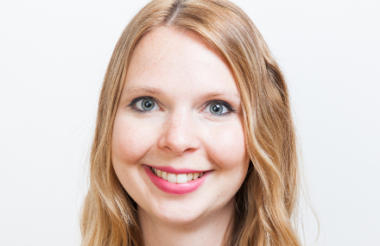Mandy Johnson, chief executive of the Small Charities Coaltition, tells Kirsty Weakley that small charities need a louder voice and explains what she plans to do about it.
Mandy Johnson joined the Small Charities Coalition ten months ago and since then has been working to raise her organisation's profile to enable it to reach more small charities and help government and the rest of the sector better understand and support small charities.
Johnson applied for the job because she saw it as an “opportunity to help multiple charities” and because she wanted to do something for a group that faced disadvantage and was unfairly perceived.
“I have always liked the David and Goliath side of things,” she says.
She says that small charities are often perceived unfairly in an underdog role. While this may be true when it comes to resources, it isn't true when it comes to impact.
"I’ve seen so much good that small charities do," she says. "I think they could be portrayed better in the media and perceived more valuably by the government. That is something that I want to contribute to.”
‘There’s a lack of understanding’
Johnson says that government and many people working in larger charities simply don’t understand the critical role that small charities can play, or how to best support them.
She’s noticed that the government has been talking about small charities a lot more in the last couple of years, but she's worried this hasn't fed through into action.
“I would like to think the reason that is happening is because they recognise that the UK would fall apart without small charities right now,” she says. She highlights the role that small charities played in aftermath of the Grenfell Tower fire disaster as an example of this work.
But government isn't sure how to help. She says the recent consultation process to develop a Civil Society Strategy was an example of this lack of understanding. The document itself was “far too long and time-consuming for most people to get their head around” and so many small charities will face no choice but to ignore it, and their voices will not be heard.
She says that the government needs to stop expecting smaller charities to come to them, and make more effort to find out what is going on
“Most small charities are not there as a lobbying function; they’re there to deliver vital services,” she said. This means government needs to be more proactive and go and “find out what their needs are”.
Similarly she says it is “peculiar” that the Office for Civil Society launched its own Local Charities Day two years ago. Government's energy, she says, might have been better used by supporting initiatives already under way in the sector. The OCS, she says, might be better off channelling its resources into helping charities with blogging and filming to get their stories our there.
‘It’s an ecosystem’
She says there are also “mixed levels of understanding” within the sector itself about how small charities fit in and why they are a “vital part of the ecosystem”. She worries that many people in larger charities look down on smaller ones.
“Some people assume that someone who works for small charities doesn’t have the capability of someone who works for large charity,” she says, "but this is definitely not my experience."
Johnson suggests that the sector needs to reconsider some of the rhetoric around small/large charities and mergers as it can be “really unhelpful”.
Being small, focused and specific can be a good thing, she says. Being larger may not be better. Rather than thinking in terms of ‘big’ versus ‘small’, Johnson says all charities should “recognise the different strengths that come with your size”. She says that all different sizes of charity are necessary to make the sector's ecosystem function effectively.
She reveals that a chief executive of a large charity told her recently that there should be just 500 charities in the whole of the UK. which was particularly surprising because “he was from a charity that should be working with charities of all sizes to deliver maximum impact”.
Building relationships
Johnson very much sees it as part of SCC’s role to help small charities foster better relationships.
One part of SCC’s role, she says, is to broker better relationships between charities in the smaller sector. She says that some smaller charities almost never speak to other charities, and that this becomes more a problem as you get further out of London. This means that these charities miss out on much of the shared learning in the sector.
This is particularly likely for “time strapped” charities with a volunteer chief executive, running the charity “on top of their day job”
“Finding time to meet with people who don’t understand them is not necessarily the best use of their time, but it is a good use of SCC’s time,” she says.
Similarly, SCC is working to broker more help from larger charities.
Matching larger charities with smaller charities was “one of the early ideas” when the umbrella body was set up, she says, and large charities are often keen to help. Many staff in bigger organisations want to give back when they have the chance.
“So far that all the relationships have been formed have been with with teams rather than at a senior level,” she says. "There is definitely a lot of potential for us to do more there."
Being vocal
Since taking over at SCC Johnson has been noticeably more vocal than her predecessor.
Over the past ten months Johnson has been “using our voice as an organisation to raise the profile of ourselves” in order to “build a platform to raise the voice of our members”.
As part of this SCC becoming less apologetic in the way it communicates. It is deliberately trying to be bolder, changing its tone of voice, and making it clear that it has a high level of confidence.
This was deliberate she says. Previously SCC had needed to invest time and energy in making itself “operationally stable”, but she took over at a point where it was “ready to start shouting again”.
Regulation
An example of this bolder approach is clear in one of Johnson’s first interventions last year, in which she decided to criticise the Fundraising Regulator for how it was treating small charities.
She says there has been little progress since in building a better relationship. She says she met with the regulator but felt that no one was listening.
“We haven't invested much time on thinking much about them since my early days,” she says. “I decided that they’re not particularly relevant. It's not worth my organisation investing any resource into them.”
The vast majority of SCC’s members will fall below the threshold means the Fundraising Regulator would ask them to pay the levy - which applies to organisations spending over £100,000 on fundraising per year.
In contrast she says the relationship with the Charity Commission is more positive.
“They seem to be listening,” she says and are “very keen to collaborate with us”.
She’s aware that the Commission has come in for criticism for being less supportive in recent years and focusing just on its regulatory side. “I think that is okay if you’re clear about what their role is," she says. "So long as they work with organisations like ours to provide guidance.”
‘Help more charities’
SCC’s overriding aim is to provide more practical help more charities. To do this it has been working internally to “make ourselves a scalable organisation”.
At the moment most of its service delivery is done by volunteers, and it doesn’t plan to change that. But that means the body needs to have “solid internal processes” in place.
SCC is also looking at how it how it can use digital technology to bridge the gaps.
“Historically large charities have created digital stuff that they have then own the IP for so every charity then has to start from scratch,” she explains. “One of the things that large charities can do for the sector is to build great things that the rest of the sector can build on top of.”
SCC is already in discussions about how to make that “a reality” and make digital transformation projects easier for smaller charities.
The infrastructure body is also trying to diversify its own income base. Until now it has been predominantly funded by trusts and foundations but is now looking to corporate supporters and even the public.
“A lot of people think that you can’t fundraise for an infrastructure body because the public won’t find it interesting enough, and I love that challenge as a fundraiser,” says Johnson.
SCC has been trying out a range of fundraising techniques from donation tins with QR codes on to social media and Amazon lists. There’s a dual purpose to this as “we’re testing things out in a way that hopefully we can share with our members,” Johnson says.
Getting louder
Membership of SCC is currently free and Johnson says there are no plans to change this model.
There are currently 9,400 members and it is growing at a rate of about three a day.
SCC is finalising its next three-year strategic plan. It is also working on partnerships “to use the skills and resources of others to amplify the voice of our members.
From now on SCC will be pushing its members to the fore.
“The last Sky piece we did we led with one of our members and then I spoke and that’s the future,” she says.
SCC will be being louder, both with government and the media. It has just appointed its first ever full-time policy and public affairs manager to do more work with government behind the scenes, as well as a communications person.
“We want small charities feel like there’s a voice out there for them,” she says. "And we’ve only just started.”
Related articles












